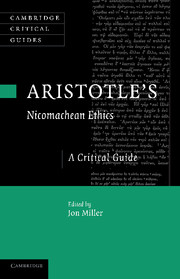Book contents
- Frontmatter
- Contents
- Contributors
- Acknowledgments
- Abbreviations and transliteration
- Introduction
- Part I Textual issues
- Part II Happiness
- Chapter 2 Living for the sake of an ultimate end
- Chapter 3 Contemplation and eudaimonia in the Nicomachean Ethics
- Chapter 4 Aristotle on eudaimonia, nous, and divinity
- Part III Philosophical psychology
- Part IV Virtues
- Bibliography
- Index
Chapter 2 - Living for the sake of an ultimate end
Published online by Cambridge University Press: 07 September 2011
- Frontmatter
- Contents
- Contributors
- Acknowledgments
- Abbreviations and transliteration
- Introduction
- Part I Textual issues
- Part II Happiness
- Chapter 2 Living for the sake of an ultimate end
- Chapter 3 Contemplation and eudaimonia in the Nicomachean Ethics
- Chapter 4 Aristotle on eudaimonia, nous, and divinity
- Part III Philosophical psychology
- Part IV Virtues
- Bibliography
- Index
Summary
It is for the sake of happiness that we all do everything else we do.
(E.N. i.12, 1102a2–3)Aristotle claims that we do everything for the sake of happiness (eudaimonia). It is now well recognized that he does not mean by this that our actions are aimed at making us feel happy, satisfied, or otherwise pleased. “Happiness” (eudaimonia), for Aristotle, is a placeholder for “the ultimate end in life” – that which we desire for its own sake and for whose sake we pursue all our other objectives (E.N. i.2, 1094a18–19; cf. i.7, 1097a30–b6). The normative question of importance to Aristotle, as well as for the rest of Greek ethics, is not whether we should pursue happiness, but rather what happiness consists in. Is it for the sake of pleasure, honor, virtue, contemplation, or something else that we should direct all our actions in life?
The answer to this normative question was disputed among the major philosophical schools in antiquity, and the precise nature of Aristotle’s own answer has been a matter of considerable controversy among his modern interpreters. Could he really be affirming, as he patently appears to in E.N. x.7–8, that the ultimate goal of life is to engage in theoretical contemplation (theoria)? Would not this “intellectualist” conception of the ultimate good imply that ethical activity (the exercise of the virtues of character) is for the sake of contemplation? And how could this be so? Aristotle’s extensive discussion of ethical activity shows no evidence that he takes it to be productive of contemplation, nor does it seem credible that he thinks our commitment to it should be contingent on its ability to yield this result.
- Type
- Chapter
- Information
- Aristotle's Nicomachean EthicsA Critical Guide, pp. 47 - 65Publisher: Cambridge University PressPrint publication year: 2011
- 5
- Cited by

